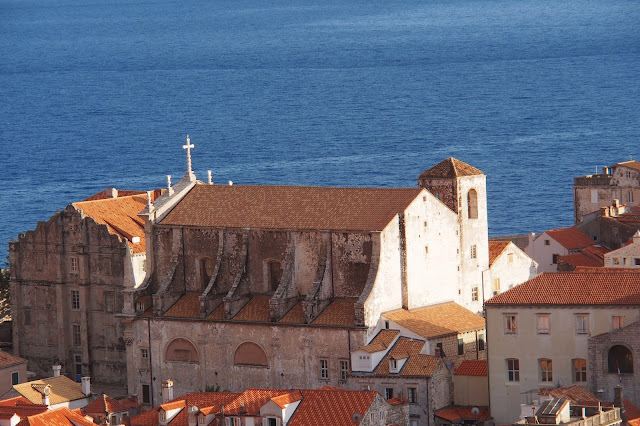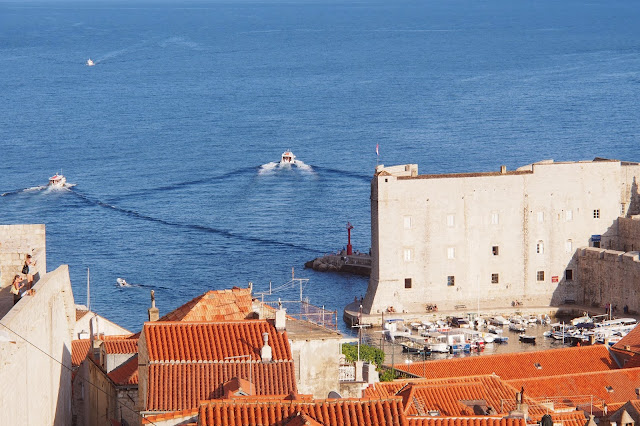After the rain in the morning, the sky seemed to have cleared.
We raced on a coastal road by the Adriatic Sea
We passed through many beaches
and some coastal settlements
The journey seemed to bode well. There was not much traffic
Our first glimpse of Dubrovnik from the coach window: its a seaside castle town.
But there were also some fortifications on top of the mountain
Its solid stone walls must have looked quite impressive in the Middle Ages. According to internet sources, the town was founded in the 8th century. After the fall of the Ostro-gothic Kingdom,it came first under the protection
of the Byzantine Empire but after the Crusades, under Venice (1205–1358), which gave it its
institutions. It got city status under the Roman Empire in 1272. However a fire destroyed almost the entire city in the night of August 16, 1296 . The city had to be rebuilt. By the Peace Treaty of Zadar in 1358 and in 1494, Dubrovnik
achieved relative independence as a vassal-state of the Kingdom of
Hungary under the name of the Republic of Ragusa ( Raugia (Ραυγια) or Ragousa (Ραγούσα) in Greek) when it began to thrive upon its maritime trade from Venice. But it began to decline after an earthquake there in 1667 which killed 5000 of its citizens and leveled most of its public buildings. It adopted its present name in 1918 after the break-up of the Austro-Hungarian Empire and became part of Yugoslavia until Croatia and Slovenia declared independence in 1991. It is now one of the most prominent tourist destinations in the Mediterranean. It has a population of slightly over 40,000 according to a census in 2011), mainly Croatians.In 1979, the city of Dubrovnik joined the UNESCO as a World Heritage Site.The city boasts of many old buildings, such as the Arboretum Tristeno, the oldest arboretum in the world, dating back to before 1492 and also the third oldest European pharmacy dating back to 1317 (and is the only one still in operation today). It is located at Little Brothers monastery in Dubrovnik. It was a refuge to Portuguese in the 16th century. In the bay of Dubrovnik is the 72-hectare wooded island of Lokrum, where according to legend, Richard the Lion Heart was cast ashore after being shipwrecked in 1192. The island includes a fortress, botanical garden, monastery and naturist beach.
Once inside the city gate, we found a huge fountain. That was to be our meeting point.
That pipe must have been a later addition
The buildings were all solidly built with stones
The street seems quite wide
The entrance to the fortified town
One could see the main street from the very thick walls
As everywhere in such old town, the most important building is the church
and how could they live without time ?
The streets are lined with shops, cafes and restaurants
As it was close by Italy, the Italian influence in their architecture could be clearly seen.
There were statues on the terrace
or hidden in enclaves
This is the way to the quayside.
And this is the way up the castle walls
There were no more battle ships, just pleasure crafts.
My first view of the harbor
This family is all set for a little fun at sea.
One could see that the walls are really thick
And as its population grew, a second church was required, and third and a fourth!
rows and rows of pleasure crafts and yachts
Everywhere, you find these orange roof tiles
Finally upon the city wall above which you find the hill settlements
The houses were built very close to each other with really narrow alleys scarcely 6 feet wide.
A closer look at the houses on the hills
Right in the middle of the walls and close to a watch tower, there's a tiny fruit juice bar
I had an ice cold orange juice
Ah a tower! That means yet more steps to climb.
That's what it's called
From the top of the fort, one could get a fairly good idea of how thick the city walls are
This is what a soldier could see from one of the lookout points on the city wall
Another small church by the sea
And one more. How people had to relied on God for everything in the Middle Ages !
Looking down from the city wall
A good view of the fortified town
The harbor from a different angle
A pretty good view of the whole town
The clouds are coming in from the sea
The domes of two churches
Another church by the sea to the right
The town was built upon a cliff
The passage of the soldiers
A view of the settlement on the opposite of another cove
The sun was low
and getting lower with every minute
Better start getting back: time for the rendezvous with the tour group.
But first one last look
And another
and another
Now this one is really the last!
Now back close to where the tour group was supposed to meet
A jet stream above the old town
The sun was definitely setting
Just one last look
Another lingering look
Our hotel
Our hotel restaurant
Our dinner
And after dinner, snooping around
A view from our restaurant




































































沒有留言:
張貼留言